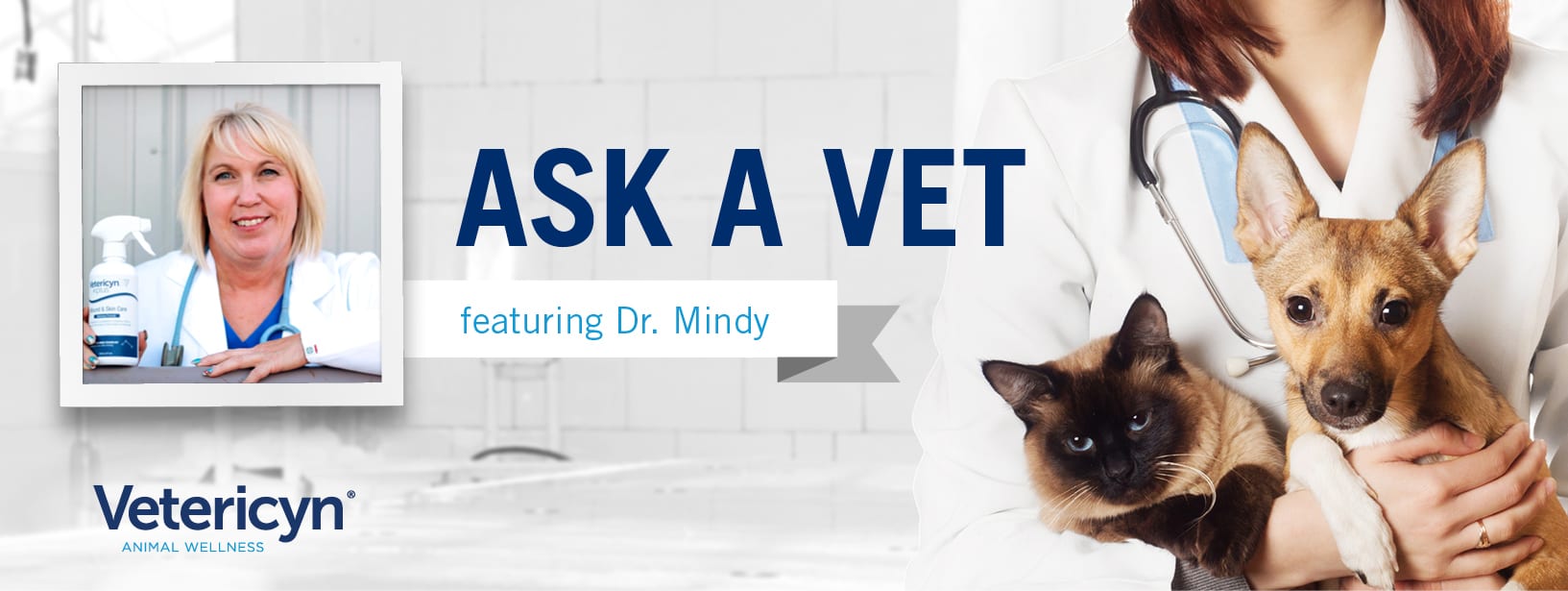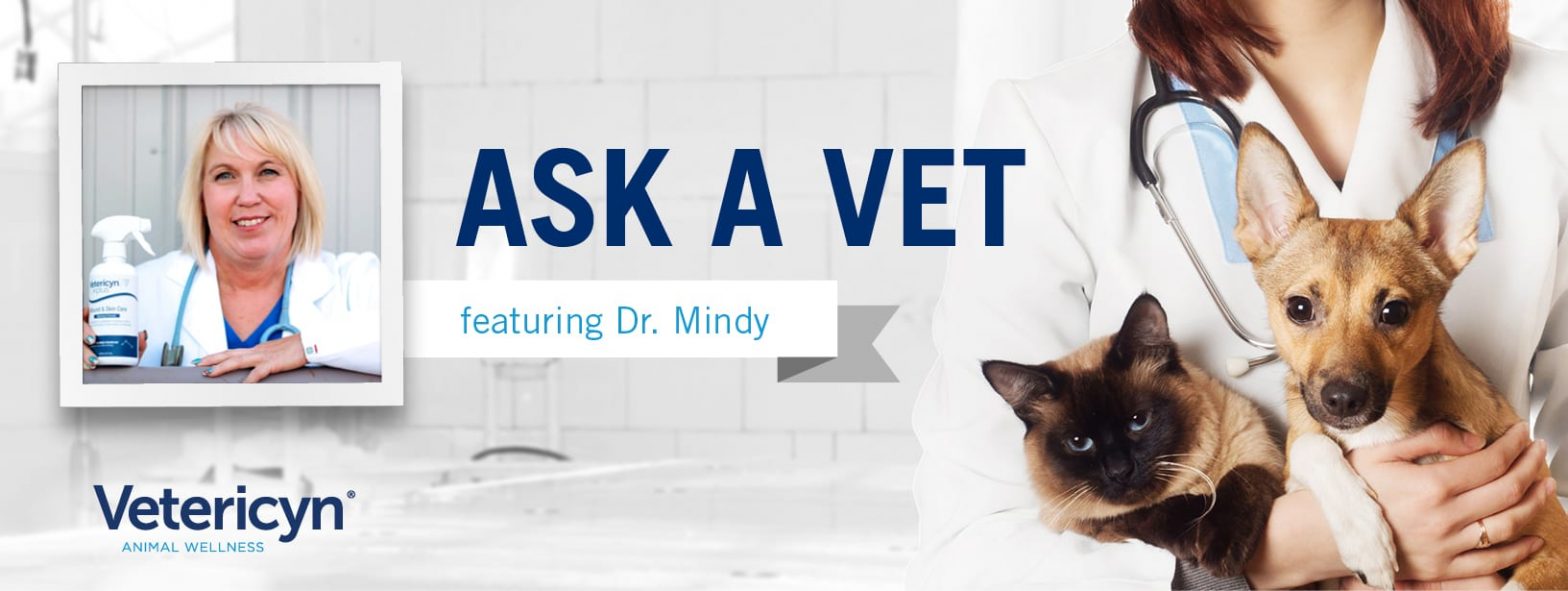
Our resident Veterinarian, Dr. Mindy, answers questions on topics like swimmer’s ear in dogs, skin issues, and grooming.
We held a Facebook Q&A with our Technical Services Veterinarian, Dr. Melinda Mayfield. Dr. Mindy has been in veterinary medicine for over 20 years. She received her DVM from Oklahoma state University and now resides in Southeast Kansas with her husband, two children, four dogs, and six horses. Prior to working with Vetericyn, Dr. Mindy owned and operated the Animal Care Center in Columbus, Kansas.
In this live we discussed common questions that people ask us about the Vetericyn line of products. Dr. Mindy took some time and typed up her thoughts on some of our most common questions. Read on to see what she had to say. And be sure to check out our Facebook page to stay up to date on events like this!
Vetericyn: Can you use the Vetericyn Ear Rinse for swimmer’s ear in dogs?
Dr. Mindy: Swimmer’s ear refers to getting water in the ear that causes discomfort for an extended period of time. What a lot of people want to do with that is dry it up. We’ve learned that the ear canal actually has a self-cleaning mechanism that helps bring the debris up out of the ear. If we dry them too much we interfere with that cleaning mechanism. So, we have gotten away from wanting to dry them so much. Our otic rinse is great for flushing the ear, soothing the ear and helping to relieve irritation. So, in that aspect it will help, but it is not a drying product. So, to address swimmers ear, I’d recommend not apply a drying product as the animal ears will clean themselves in time.
Vetericyn: How is Vetericyn Plus hydrogel different from the liquid?
Dr. Mindy: They both are based on the hypochlorous technology platform. The liquid is more for flushing, cleaning, and irrigating wounds and has a viscosity similar to water. What I use it for initially is when I have a wound that I need to be cleaned up. I irrigate it and flush it out.
The hydrogel adheres and has a viscosity profile similar to ketchup. Once you get the wound clean the hydrogel is a great dressing product. It will keep the wound moist, protect it, and adhere to it. It’s really a moisture-donating product. If you’ve got a drier wound that you want to keep moist, especially those drier areas that you can’t bandage like udder problems on cattle, you can put the gel on. It will help protect the wound when you can’t bandage the animal.
If you have a really wet wound then you will want to stay with the liquid instead of using the hydrogel. It depends on the wounds you are treating and wounds can change. You may have a wound that is very wet and then as it heals it may become drier. Then you will want to use the liquid at first and then switch to the hydrogel.
Vetericyn: Can I use the Equine FoamCare Medicated shampoo on my dog?
Dr. Mindy: You know I get this a lot! We worked hard to formulate our FoamCare Equine Medicated shampoo specifically for issues horses are prone to. We also developed FoamCare Pet Medicated shampoo for the same reason–to help with skin issues common in dogs. I always recommend using FoamCare Pet Medicated on dogs since it’s designed for a dog. And if issues persist, always consult with your Veterinarian.
Vetericyn: Can Vetericyn FoamCare Medicated shampoo help with mite damage?
Dr. Mindy: It can help with the damage. It’s not a parasitoid, so it’s not going to kill the mites. You would have to use another product for that and actually get rid of the mites.
Once you’ve killed the mites you can go in and help clear up the irritation, help soothe them and relive the dryness and itching and problems that mites can cause. It will help after you kill the mites but it will not kill the mites themselves.
Vetericyn: My dog keeps wanting to lick the wound. I know this is normal for the dogs to want to do but will your products harm him if he licks after I have put on him?
Dr. Mindy: That’s one of the things I’ve always loved about Vetericyn when I was in practice because invariably if I would send something home and it was some type of ointment or cream then the animal would get into it and then I would get a call in the middle of the night. The animal had gotten in and ingested the tube and I had to worry about weather I needed him to come into the clinic and make them throw up or give them anti-charcoal.
When I started using Vetericyn and learned how safe it was and someone would call me and say hey my dog got into that bottle or destroyed the bottle and drank some of the Vetericyn or licked it. I’m like it’s perfectly fine and it’s completely safe if it’s licked or ingested and safe for the eyes, ears, nose and mouth. That’s one thing that I really loved about it is that it is safe. If your pet is known to lick, I suggest trying our hydrogel as it tends to be a natural licking deterrent due to the silicate based gel agent we use to suspend the hypochlorous technology. It has a very chalky taste and not the most pleasant texture to have in your mouth.
Be sure to like the Vetericyn Facebook Page to stay in the know about upcoming Facebook live events!
You Might Also Like: 5 Easy Steps to Treating Your Dog’s Hot Spot


